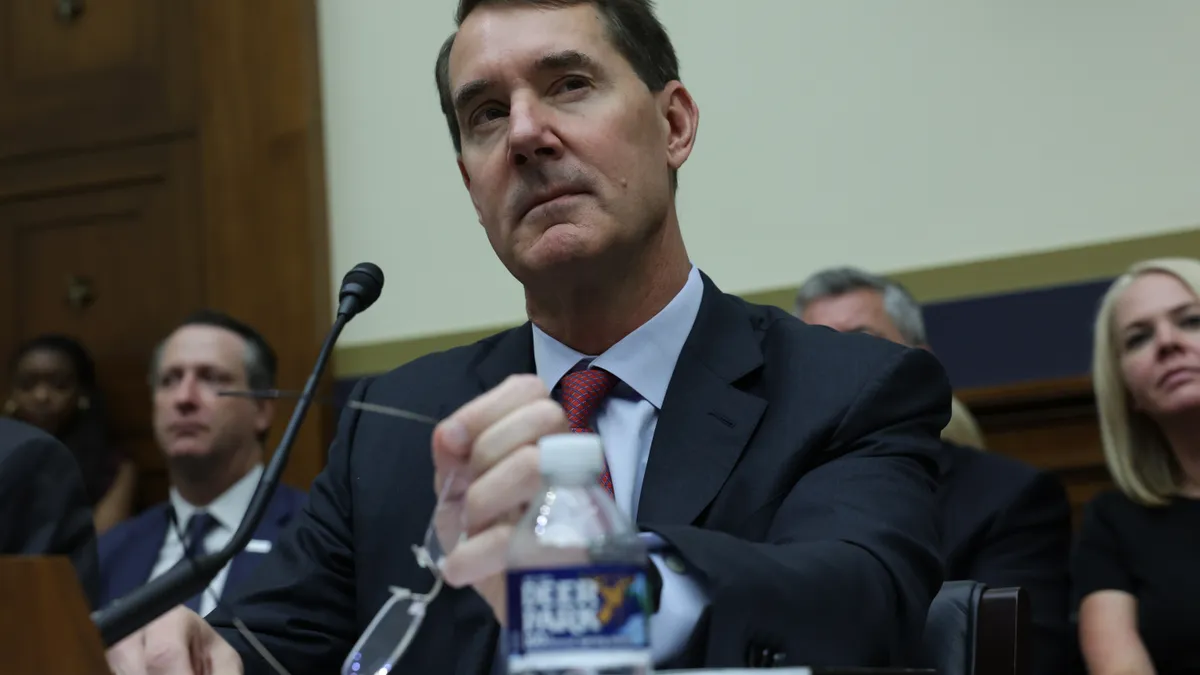UPDATE: March 5, 2021: Goldman Sachs pledged to achieve net-zero greenhouse-gas emissions in its financing activities by 2050 and net-zero carbon emissions in its supply chains by 2030, according to a Thursday statement from CEO David Solomon posted on the bank's website. Goldman also will set interim, business-related climate targets by the end of the year, Solomon said.
The three-pronged goal matches, blow-by-blow, a commitment new Citi CEO Jane Fraser made for her bank Monday.
Goldman also announced Thursday it has joined the U.N. Principles for Responsible Banking, an initiative Citi became the first major U.S. bank to endorse in July 2019.
Additionally, Goldman has joined the OS-Climate Initiative, a consortium created to develop an open-source data pool and net-zero alignment tools, Solomon said. Other members include Amazon, Microsoft and Allianz.
And the bank is adding carbon accounting to its investing application, Marquee, to help clients track their ties to emissions.
Solomon's statement serves as an update, too, on Goldman's progress toward its December 2019 pledge to commit $750 billion in loans, underwriting, advisory services and investments toward companies and projects focused on renewable energy, sustainable transportation, affordable education and other areas.
The bank has put $156 billion toward that decade-long goal, including $93 billion focused on climate transition, Solomon said Thursday.
Collaboration, though, is vital, Solomon stressed. "We encourage business leaders from all industries to join these collective efforts," he wrote. "After all, it's the gains we make in the short term that will make our success in the long term possible."
-----
Goldman Sachs strengthened its environmental stance this week, targeting $750 billion over the next 10 years for "climate transition and inclusive growth finance," the bank's CEO, David Solomon wrote Sunday in an op-ed in Financial Times.
That figure represents the amount Goldman seeks to commit in loans, underwriting, advisory services and investments toward companies and projects focused on renewable energy, sustainable transportation, affordable education and other areas, the bank said.
"Companies have traditionally treated sustainability as a peripheral issue," Solomon wrote. "We don't have the luxury of that limited perspective any more."
Some of the changes to Goldman's policy are aimed specifically at fossil fuel reduction. The bank has vowed to phase out financing for thermal coal mining companies that don't have strategies to diversify away from that fuel source "within a reasonable timeframe."
Goldman also pledges to decline financing projects of new coal-fired power plants in developing nations unless they have carbon capture and storage or another form of technology to reduce emissions. The bank's previous policy only put such limits on projects in the U.S. and developed countries.
Further, the bank has implemented a ban on direct finance for new Arctic oil exploration and production.
The Rainforest Action Network (RAN), an environmental advocacy group, lauded the policy for having the "strongest fossil finance restrictions of any major U.S. bank," but noted it still trails more progressive stances taken by European banks, such as Credit Agricole and BNP Paribas.
"By ruling out direct finance for Arctic oil exploration and production, Goldman has established the first no-go zone for a major U.S. bank in the oil and gas sector," Jason Opeña Disterhoft, a senior campaigner at RAN, said in a statement.
A Goldman Sachs spokesperson told Banking Dive the bank's environmental policy has been evolving since it was first written a decade and a half ago, around the time the bank established its sustainable finance group.
Goldman is far from the only financial institution with its eye on socially responsible stances. The global market for responsible loans has increased 40% since last year, S&P Global found in September.
Banks such as Barclays, Bank of America, JPMorgan Chase and Wells Fargo have announced they will stop financing operators of private prisons amid controversy over immigrant detention centers and the institutions that finance them. Citigroup and Bank of America have set restrictions on their business customers regarding gun sales.
On climate in particular, 130 banks signed on to the United Nations' Principles for Responsible Banking this fall, pledging to align their business with the goals of the U.N.'s Paris Agreement on Climate Change. And fintechs have followed suit. Stripe in August announced its commitment to carbon recapture and storage.
Government lag
Governments have been slower to progress. Climate talks ended Sunday in Madrid with the world's largest countries failing to agree on stronger plans to curb their emissions. At the national level, Rep. Debbie Dingell, D-MI, last week introduced a House bill to establish a National Climate Bank, which is meant to mobilize up to $1 trillion in private investment over a decade.
However, when corporate policy makers outpace those in government, the question of accountability can be left open. Solomon noted in his Sunday op-ed that "in most places, there is no pricing mechanism to capture the cost of greenhouse gas emissions to society."
"Governments must put a price on the cost of carbon, whether through a cap and trade system, a carbon tax or other means," Solomon wrote. "Combining public policy, technology and capital is a must, not a choice."
Until that point, banks can rely on other metrics, such as the amount of carbon reduction or the number of people served, Solomon wrote.
But that still leaves banks without regulatory consequences if they fail to reach their own benchmarks in the environmental sector. Banks may have to take on somewhat of a self-policing role, but they shouldn't be alone, an advocate said.
"These are voluntary policy changes. They're not enshrined into law," Ben Cushing, a campaign representative for Sierra Club, told Banking Dive. "When companies make these sorts of public commitments, it's up to customers and organizations to hold them accountable and make sure they live up to their public promises."
The Goldman Sachs spokesperson said the updated policy not only codifies the bank's views on environmental lending and investments; it represents a demand from clients, which the bank can help through transitions as the market changes.
Solomon cited Goldman Sachs's work with an Italian utility company, Enel, which aims to generate at least 55% of its power through renewables by the end of 2021.
"The needs of our clients will increasingly be defined by sustainable growth," Solomon wrote. "Our firm's long-term financial success, the stability of the global economy and society's overall wellbeing all depend on it."





















